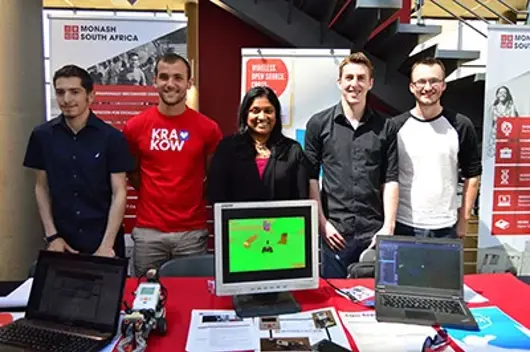On 22 September 2016, four of our most innovative students from the school of IT each demonstrated the technological marvels that they have invented, developed and worked into prototypes. Honours student Nadim Saklawi, third year students Jonathan Greve and Rupert Wiser and second year student Daniel Rosenberg each showcased what they had been working on to students and staff.
Nadim’s project, titled TabletPOS, is a working prototype for a wireless transaction system that is adaptable to different sales scenarios. His expertise in mobile applications helped Nadim to develop the system, which provides a low cost trading management system through the use of tablet. The tablet, containing the app, has a battery life of twelve hours and can also be connected to a thermal printer, making it a fully portable battery operated sales system. The TabletPOS has particular value in countries that frequently experience power outages or run on unstable power. With this tablet, business would be able to continue as usual, regardless of external circumstances.
Jonathan’s project; Anonymous Video Analytics, can track individual faces, compare them to a database and then produce predictions as to gender, age or any specified predictor. The app then sends the information to a cloud server, which was also developed by Jonathan, to be used for analyses and metrics. None of the information that passes through the system is stored, and works on real-time metrics such as people counting and ‘dwell-time’. The potential for commercial use of Anonymous Video Analytics is high, as the technology could also extend to object detection, research purposes and of course be used by law enforcement through the identification of persons of interest.
Rupert’s project is an educational programme game called Proxy. Throughout the game the user will learn how to write code to survive. The game is set in a desolate world, where your machine is your only defence, and you will fight battles using the code you will progressively learn to create. The combination of gaming and learning makes Rupert’s project particularly interesting, especially for those interested in the field of IT. It could be used by interested individuals or as part of class learning, making Proxy a potentially highly marketable success.
Daniel’s project uses a programmed Lego robot to complete tasks and games. The robot is able to move, draw onto a screen and detect events through ultrasound, infrared, light sensor, touch and sound sensors. The impressive level of reaction to stimuli this creates in the robot makes this a fun, interactive project that is bound to appeal to many.
Jaques Steyn, Head of the School of IT, says “At MSA, we prepare our IT students with a wide scope of in-depth IT skills, so that when they graduate they leave armed with the tools for success in their chosen careers. Nadim, Jonathan, Rupert and Daniel are fantastic ambassadors for what we do in the School of IT at MSA, and we are very proud of them for their achievements. They are showing some of the practical applications of what they are learning, as well as demonstrating that they can apply their creative minds and technical expertise to design IT products beyond what is expected from our formal course”.


